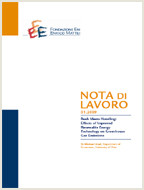Games on Networks: Direct Complements and Indirect Substitutes

06.01.2013
Sergio Currarini, Elena Fumagalli, Fabrizio Panebianco
D01, D85
Networks, Peer Effects, Key-player, Centrality, Substitutes, Altruism
Climate Change and Sustainable Development
Carlo Carraro
Many types of economic and social activities involve significant behavioral complementarities (peer effects) with neighbors in the social network. The same activities often exert externalities that cumulate in "stocks" affecting agents’ welfare and incentives. For instance, smoking is subject to peer effects, and the stock of passive smoke increases the marginal risks of bad health, decreasing the incentives to smoke. In the linear quadratic framework studied by Ballester et al. (2006), we consider contexts where agents’ incentives decrease with the "stock" to which neighbors are exposed (agents may, for instance, care about their friends’ health). In such contexts, the patterns of strategic interaction differ from the network of social relations, as agents display strategic substitution with distance-two neighbors. We show that behavior is predicted by a weighted Bonacich centrality index, with weights accounting for distance-two relations. We find that both maximal behavior and key-players tend to move to the periphery of the network, and we discuss the effect of close-knit communities and segregated groups on aggregate behavior. We finally discuss the implications for peer effects identification and for the emergence of potential biases in the estimation of social effects.
